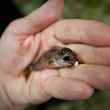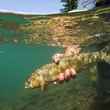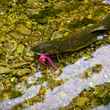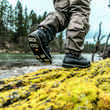Researchers at Canada's Simon Fraser University announced recently that Infectious Salmon Anemia (ISA) was detected in two wild sockeye salmon collected from the waters of Rivers Inlet, British Columbia. This marks the first time that ISA has been detected in fish found in pacific northwest waters, whether wild or farmed. The discovery has caused a considerable amount of alarm, given the potential threat that ISA poses to the already-dwindling stocks of wild salmon in pacific northwest waters.
ISA has long been a problem for salmon farming operations in the waters off Norway, Scotland, eastern Canada and Chile. The virus, by infecting the red blood cells, causes severe anemia in affected fish, often leading to death. Mortality rates in infected farming operations as high as 100% have been observed. Loss rates of 70% are not uncommon. There is no treatment for the disease once a fish is infected and vaccines designed to prevent infection are considered less than effective and difficult to administer.
Scientists warn that the potential affects of ISA on wild salmon could be devastating, although much is still unknown and pacific salmon are considered to be less affected by the disease than atlantic salmon. In an article in the Vancouver Sun, Biologist Alexandra Morton -- who collected the fish for the study -- suggests that evidence has already been observed that indicates that ISA can affect pacific northwest salmon. Wild salmon advocates are citing this recent discovery as further evidence that Canada should impose regulations requiring that all salmon farms been moved onto land and are urging that the detection of ISA in northern pacific waters be treated as an emergency.
The salmon farming industry is quick to counter, stating that the study's results cannot yet be confirmed. The B.C. Salmon Farmers Association has called attention to the fact that the positive tests for ISA in the two fish has not yet been confirmed by the CFIA (Canadian Food Inspection Agency). According to the industry, false-positive results for ISA are not uncommon.






























Comments